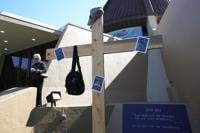PARIS (AP) — As soon as Michel Barnier was named France's new prime minister, critics found a skeleton in his closet. Back in 1981, the 30-year-old lawmaker joined more than 150 conservatives in the ��ɫֱ�� Assembly to vote against a law decriminalizing young homosexuals.
That history loomed in the background as President Emmanuel Macron appointed the 73-year-old Barnier on Thursday to take over from Gabriel Attal, France's first openly gay prime minister.
At age 35, Attal had also been the youngest of 26 prime ministers who have served modern France's Fifth Republic. Barnier is the oldest.
Far-left leader Jean-Luc Mélenchon was among the first to point out the new prime minister's past stance on gay rights. "What is the meaning of such a message?" he asked.
France's history of laws targeting homosexuality
Although French Revolutionaries of 1789 abolished the crime of sodomy, French judges subsequently used public indecency laws to broadly punish tens of thousands of people for homosexuality in the 19th and 20th centuries, researchers say.
After France's 1940 defeat by Germany in World War II, the Vichy government that collaborated with the country's Nazi occupiers also introduced a law that specifically targeted homosexuality. With some adjustments, that law stayed on the books long after France's liberation in 1944, all the way until 1982.
Over four decades, it was used to convict around 10,000 people, says Régis Schlagdenhauffen, a researcher at Paris' School for Advanced Studies in Social Sciences.
The Vichy law punished homosexuality by making it illegal if it involved minors younger than 21, though the age of consent for heterosexual sex was 13, researchers say.
“So a heterosexual relationship, say, between people aged 18 and 22 wasn't a problem," says Antoine Idier, a researcher of LGBTQ+ history at the Sciences-Po school of political science in Saint-Germain-en-Laye, a Paris suburb.
“But the same homosexual relationship ... was considered a crime,” Idier added.
In 1945, the age of consent for heterosexual sex was raised to 15 but remained at 21 for homosexual relations until 1974, when it was lowered to 18 — still three years more than for heterosexuals.
That difference in treatment which discriminated against homosexuality only ended in 1982. Barnier was among in the ��ɫֱ�� Assembly in December 1981.
“Their argument was that it was necessary to protect young people from homosexuality," Idier said.
��ɫֱ�� Assembly archives show that Barnier did not speak up during the debate. But another opponent who did, Jean Foyer, warned the change could put teenage boys at risk from older men and shift public opinion on homosexuality.
"What was punishable yesterday becomes not only indifferent but almost praiseworthy the next day,” he said.
Homosexuals were also specifically targeted with another public indecency law, enforced from 1960 to 1980.
Barnier voted twice against progress on gay rights
In the ��ɫֱ�� Assembly archives, Idier found that against a step forward for gay rights after lawmakers were moving toward abolishing the laws that targeted homosexuals.
The conservative majority at the time introduced an amendment to keep the Vichy law on the books, he says.
The amendment called for jail terms between six months and three years — plus fines — for “anyone who committed an indecent or unnatural act with a minor individual of the same sex.”
It passed with a 278-202 vote in favor.
“Like his right-wing colleagues, Barnier voted to maintain the Vichy arrangement, when the initial intention had been to abolish it,” he said.
Joseph Franceschi, a Socialist, was among those who spoke out against the amendment, saying that homosexuality "cannot constitute in itself a crime for either a man or a woman,” according to the archives.
The amendment helped keep the Vichy law on the books until it was abolished in 1982, Idier says.
That Barnier voted twice against progress on gay rights is “anecdotal but at the same time still interesting to know that it wasn't just an error," he said.
Does Barnier's voting record on gay rights matter today?
Schlagdenhauffen, the researcher at the Paris center, says that he'd like to know whether more than 40 years later, Barnier would vote differently.
“Perhaps Mr. Barnier has become wise,” he said.
A key test, he says, will be whether Barnier facilitates the progress of a draft law, introduced in 2022, that aims to indemnify people punished for homosexuality from 1942 to 1982 and recognize the persecution they suffered.
“If he wants to show that things can be done differently, he’ll move ahead with this law," the researcher said. "Otherwise, he'll bury it.”
Barnier's office did not respond on Friday to emailed questions from The Associated Press asking whether he regretted how he voted and if he would vote differently on the issue today.








































